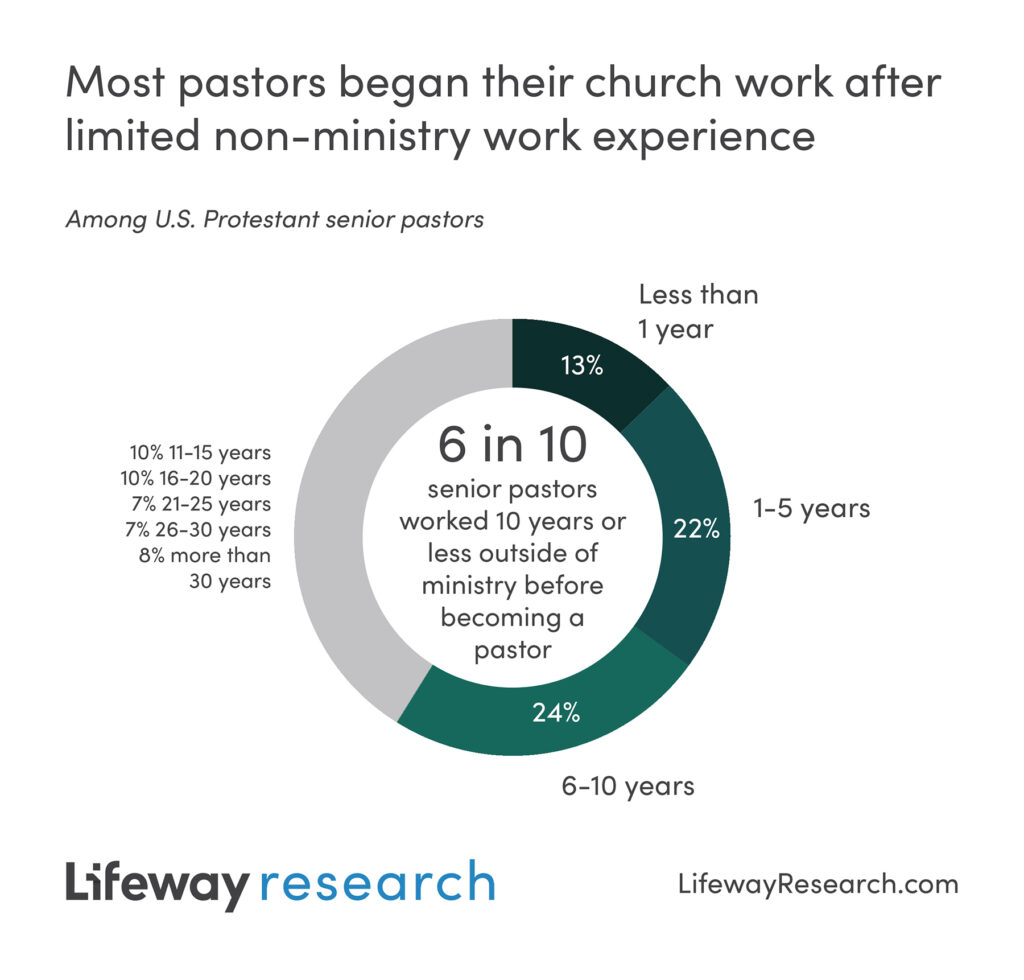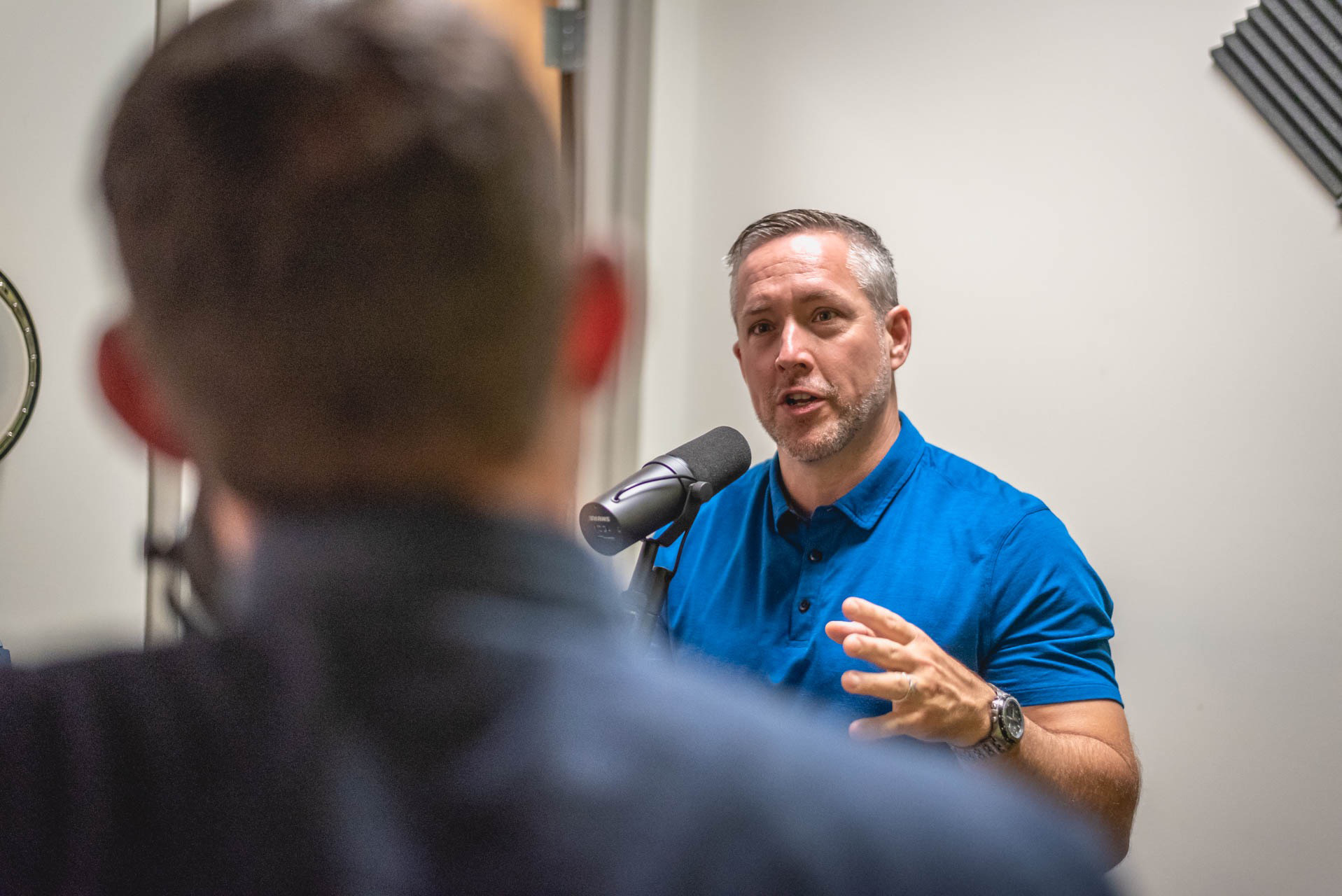
BRENTWOOD, Tenn. (BP) – A pastor’s resumé might include multiple churches and ministry roles, but most won’t have much non-ministry experience listed.
Most current U.S. Protestant senior pastors worked outside of ministry as adults for only a short time, according to a Lifeway Research study. Only 3 in 10, however, began vocational ministry as the senior pastor.

“A person’s journey to the pastorate can happen at almost any age, but the majority of pastors are in a ministry job by their early 30s,” said Scott McConnell, executive director of Lifeway Research. “Ministry skills are typically developed in more junior positions at a church, but some senior pastors learn on the job.”
Work before ministry
In the period between graduating high school and becoming a senior pastor, a third of pastors (34 percent) say they spent five years or less working in a non-ministry job, including 13 percent who have less than a year of secular work experience. Another quarter (24 percent) say they worked outside ministry for six to 10 years. Fewer have longer non-ministry careers before becoming a senior pastor, including 10 percent who worked for 11-15 years outside the church, 10 percent 16-20 years, 7 percent 21-25 years, 7 percent 26-30 years and 8 percent who spent more than 30 years in non-ministry jobs.
“Years of work experience in non-ministry roles can help pastors relate to the experiences of those in their congregations and to develop relationships with people outside their churches,” McConnell said.
As older pastors are the ones who have lived long enough to have decades of post-high school experience, pastors 65 and older (20 percent) are the most likely to say they worked outside of ministry more than 30 years. Additionally, most younger pastors have worked outside of ministry for a brief time. Pastors aged 18-44 are the most likely to say their secular work experience before coming to the church as a pastor lasted six to 10 years (35 percent) or one to five years (29 percent).
Pastors without much formal education probably also spent time working outside the church. Those with no college degree are the most likely to say before they became a senior pastor, they worked in non-ministry employment for 26-30 years (15 percent) and more than 30 years (17 percent).
White pastors (23 percent) are more likely than African American pastors (6 percent) to have a brief one-to-five-year non-ministry work experience.
One in 5 Lutheran (20 percent) and Restorationist movement pastors (20 percent) say they worked outside the church for less than a year, compared to 11 percent of Baptists and 7 percent of non-denominational pastors.
Ministry experience
Most senior pastors didn’t step immediately into a lead pastor role as their first ministry position. Seven in 10 started somewhere else in the church. On average senior pastors held 1.7 other ministry roles before their current position as a senior pastor.
More than 2 in 5 say they previously served as a youth or student minister (44 percent) or an assistant or associate pastor (42 percent). Fewer say they worked as a children’s or kids’ minister (16 percent) or another church ministry position (18 percent). Three in 10 (30 percent) say they had no previous ministry positions before becoming a senior pastor.
“Leading, teaching, equipping, and caring for people are skills all ministers utilize,” McConnell said. “So, regardless of the age or specific ministry within the church there are opportunities to develop skills senior pastors need.”
Pastors 65 and older are the least likely to say they’ve served as an assistant or associate pastor (33 percent) or as a youth or student minister (28 percent). Younger pastors, those 18-44, are the least likely to say they had no previous ministry positions before becoming a senior pastor (20 percent).
Hispanic senior pastors are the most likely to say they previously worked as an assistant or associate pastor (54 percent) and among the most likely to say they were a children’s or kids’ minister (29 percent). African American pastors are the least likely to say they served as a youth or student minister (30 percent) and the most likely to say they had no previous ministry experience (44 percent).
Pentecostal (56 percent) and non-denominational pastors (52 percent) are among the most likely to say they worked as an assistant or associate pastor. Pentecostal (54 percent), non-denominational (54 percent) and Baptist pastors (49 percent) are among the most likely to have spent time as a youth or student minister. Pentecostal senior pastors are also among the most likely to have been a children or kids minister (27 percent). Lutherans (41 percent) are among the most likely to say they had no ministry experience before becoming a senior pastor.
Pastors of the largest churches, those with 250 or more in worship attendance, (61 percent) are more likely than pastors of small churches, those with less than 50 in attendance, (38 percent) and normative churches, those with 50-99 for worship services, (41 percent) to say they previously served as a youth or student minister.
Pastor search
Around 4 in 5 senior pastors (83 percent) say their church spent less than a year without a pastor before they started. For 2 in 5 (42 percent), the church waited less than a month. A quarter (23 percent) say the time without a pastor was one to six months. Another 18 percent say it lasted for at least seven months but less than a year. Fewer senior pastors say the church spent 13-18 months (7 percent), 19-24 months (6 percent) or more than two years (5 percent) without a pastor before they arrived.
“Many churches utilize a pastor search process that can sometimes be lengthy,” said McConnell. “Pastors reporting there was little to no time between pastors when they arrived may include situations in which the church had an interim pastor, the pastor leaving stayed until the new pastor was found or leaders in their denomination quickly appointed a pastor.”
Larger churches don’t spend long between pastors. Those at churches with 250 or more are the most likely to say their congregation spent less than a month without a pastor before they started (67 percent).
Different types of churches have different processes for filling vacancies. Some denominations appoint pastors to churches, while other congregations are autonomous and select their own. Methodist pastors (81 percent) are the most likely to say their congregation spent less than a month without a pastor. Non-denominational (59 percent) and Pentecostal (53 percent) pastors are more likely than Presbyterian/Reformed (30 percent), Baptist (28 percent) and Lutheran pastors (24 percent) to say their church was without a pastor for less than a month before they began serving.
For more information, view the complete report and visit LifewayResearch.com.
Methodology
The phone survey of 1,004 Protestant pastors was conducted Aug. 29, 2023 – Sept. 20, 2023. The calling list was a stratified random sample, drawn from a list of all Protestant churches. Quotas were used for church size. Each interview was conducted with the senior pastor, minister or priest at the church. Responses were weighted by region and church size to reflect the population more accurately. The completed sample is 1,004 surveys. The sample provides 95 percent confidence that the sampling error does not exceed plus or minus 3.2 percent. This margin of error accounts for the effect of weighting. Margins of error are higher in sub-groups.






















